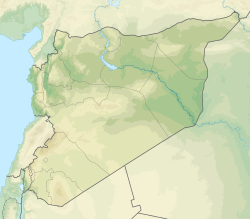| Location | Syria |
|---|---|
| Region | Aleppo Governorate |
| Coordinates | 36°28′N 37°06′E / 36.47°N 37.10°E |
Arpad (Old Aramaic: 𐡀𐡓𐡐𐡃, romanized: ʾRPD; Biblical Hebrew: אַרְפַּד, romanized: ʾArpaḏ or אַרְפָּד, ʾArpāḏ;[1] modern Tell Rifaat, Syria) was an ancient Aramaean Syro-Hittite city located in north-western Syria, north of Aleppo. It became the capital of the Aramaean state of Bit Agusi established by Gusi of Yakhan in the 9th century BC.[2] Bit Agusi stretched from the A'zaz area in the north to Hamath in the south.[3]
Arpad later became a major vassal city of the Kingdom of Urartu. In 743 BC, during the Urartu-Assyria War, the Neo-Assyrian king Tiglath-Pileser III laid siege to Arpad following the defeat of the Urartuan army of Sarduri II at Samsat. But the city of Arpad did not surrender easily. It took Tiglath-Pileser three years of siege to conquer Arpad, whereupon he massacred its inhabitants and destroyed the city.[4] Afterward Arpad served as a provincial capital.[5] Tell Rifaat, which is probably the remains of Arpad, has walls still preserved to a height of eight meters.[6]
- ^ "BDB, אַרְפַּד 1". www.sefaria.org.
- ^ Lipinsky, Edward (2000). The Aramaeans: Their Ancient History, Culture, Religion. Peeters Publishers. p. 195. ISBN 9789042908598.
- ^ Lipinsky, 2000, p. 99.
- ^ Healy, Mark (1992). The Ancient Assyrians. Osprey. p. 25. ISBN 9781855321632.
- ^ Kipfer, Barbara Ann (2000). Encyclopedic Dictionary of Archaeology. Springer Science & Business Media. p. 626. ISBN 9780306461583.
- ^ Lipinsky, 2000, p. 529.
